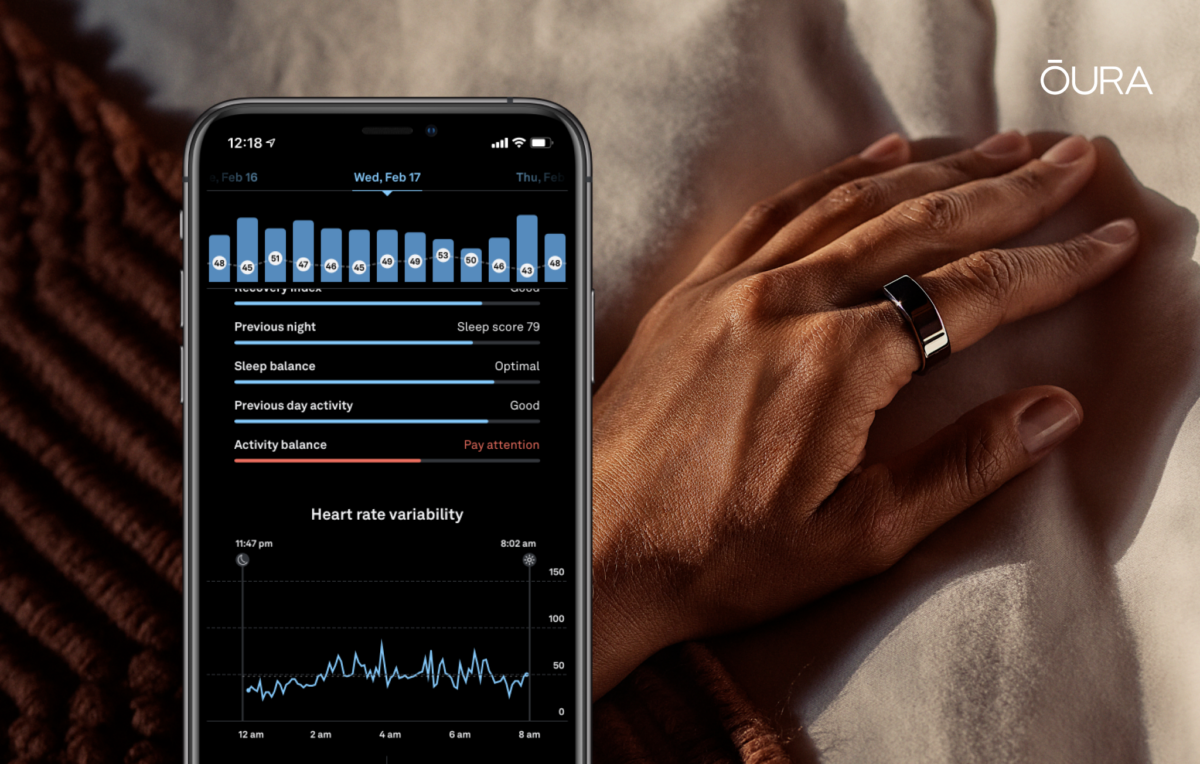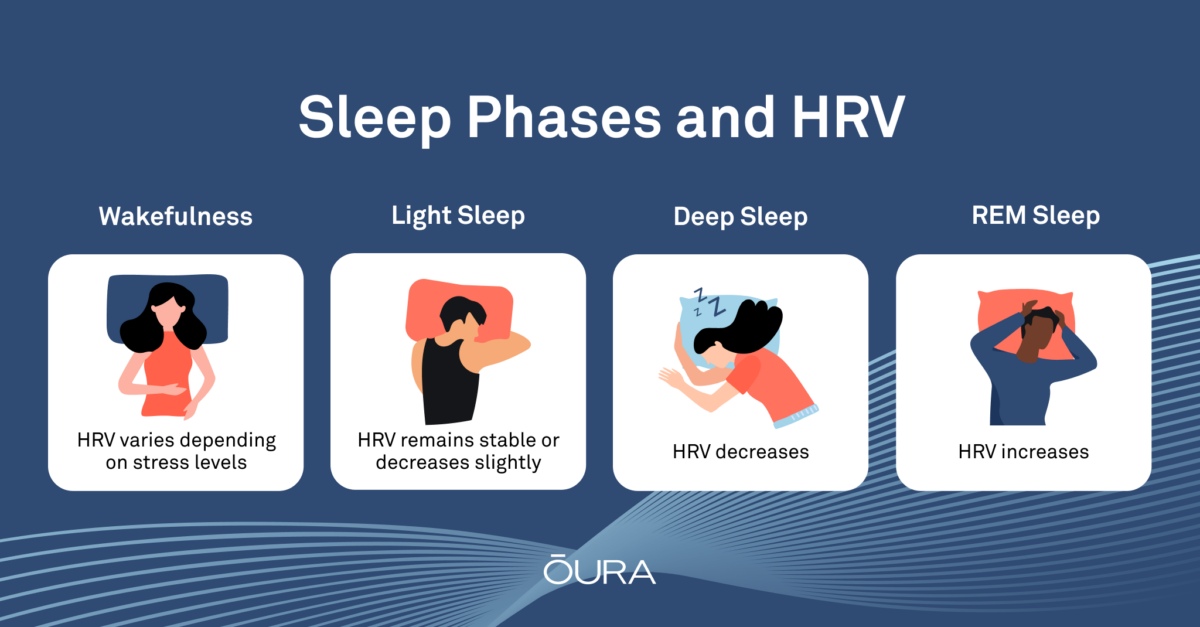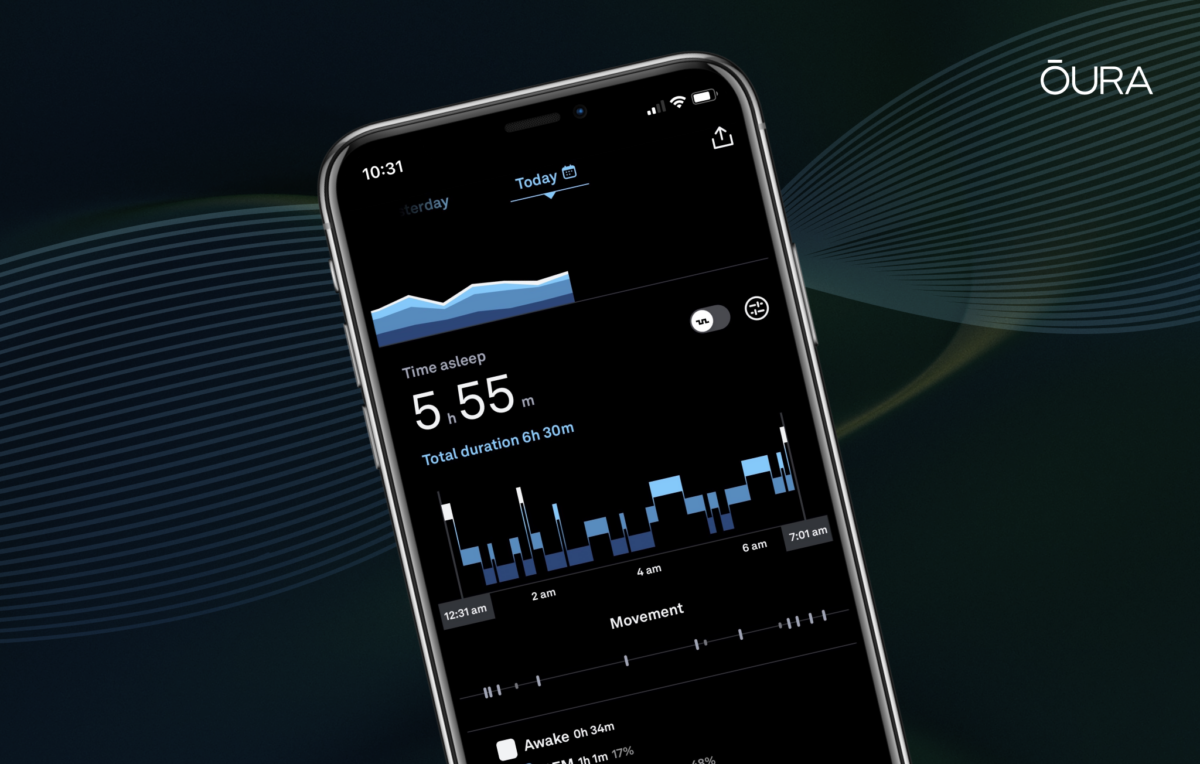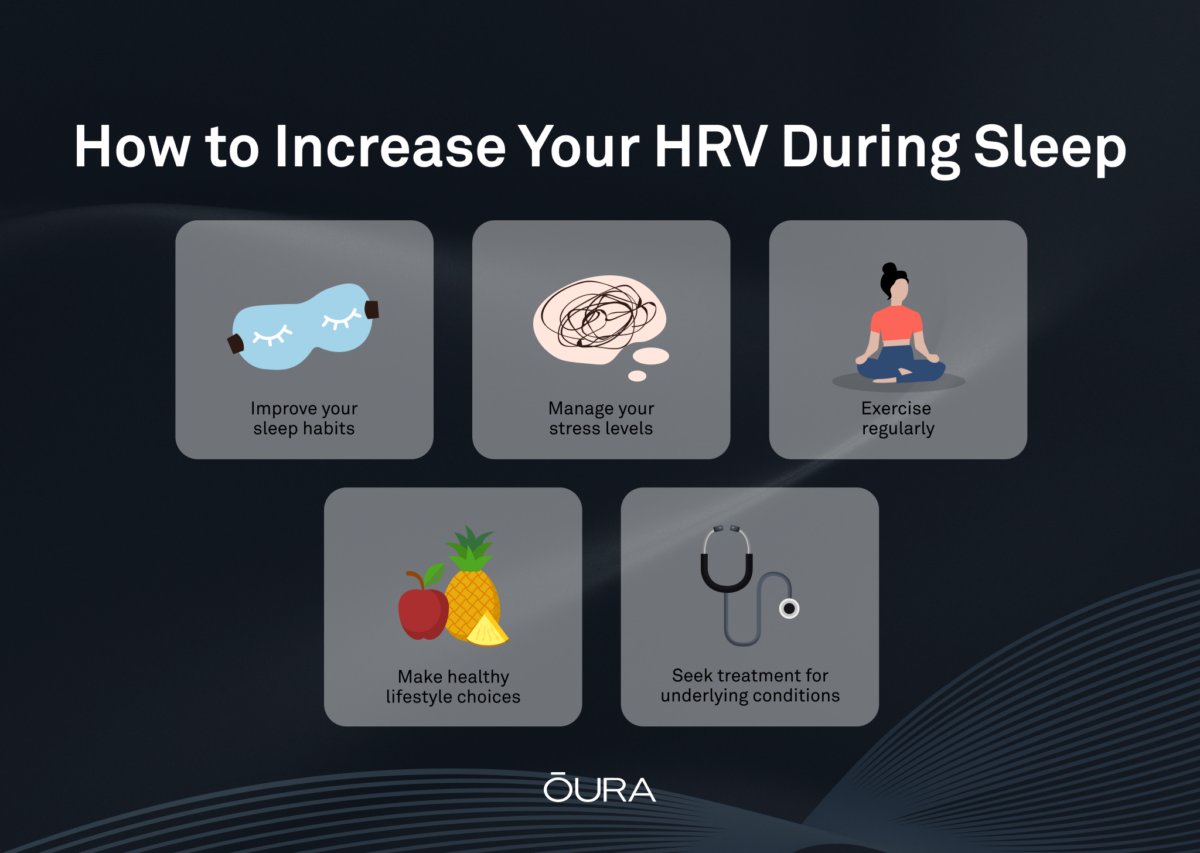- Many factors can contribute to low HRV during sleep, including stress, alcohol, and underlying health conditions.
- A low HRV during sleep is associated with longer sleep latency and lower-quality sleep.
- Adjusting your lifestyle and speaking with a healthcare provider can help improve your HRV during sleep.
Heart rate variability (HRV) can tell you a lot about your health. Specifically, it can provide insights into how your body responds to life’s stressors, both mental and physical.
HRV refers to the natural fluctuations that occur between heartbeats and is closely linked to the autonomic nervous system (ANS), which controls everything from your breathing rate to your digestive system.
Just like a skyscraper that sways in the wind is more able to withstand the pressures of high-altitude winds, a heart with a higher HRV is more agile and able to respond to stress better.
As a general rule:
- A higher HRV (relative to your baseline) is associated with parasympathetic activity, general physical fitness, and good recovery. Research shows that higher average nighttime HRV measurements are linked to better sleep quality.
- A lower HRV (relative to your baseline) is associated with sympathetic activity, stress, illness, and overtraining.
However, it’s worth noting that individual variations in HRV are normal, and factors like age, overall health, medications, and sleep disorders can influence these patterns. If you have concerns about your HRV, it’s always best to consult with a healthcare professional for more personalized evaluation and guidance.
| Member Tip: Oura members with menstrual cycles may notice that their HRV is lower during the second part of their cycle — the luteal phase. |
READ MORE: HRV and Stress: What HRV Can Tell You About Your Mental Health
How Oura Measures HRV: How Accurate is Oura Ring?
In a medical setting, HRV is measured using an electrocardiogram (ECG) which measures the electrical activity of the heart using sensors attached to your chest. However, a wearable tracker like Oura is an easier, faster, and more convenient way to measure your HRV and track trends over time.
Plus, Oura’s measurement are proven to be accurate. In a 2020 study, researchers found the Oura HRV measurements had extremely high agreement (r² = 0.980) when compared to a medical-grade ECG.
Over the course of the night, Oura measures your HRV minute by minute in order to give you the most complete picture possible of how your body responds to stress. This is because your HRV changes over the night as you move through different sleep stages, so measuring your HRV for the whole night helps you understand how your body responds to all types of stress.

Plus, with Oura Tags and Trends features, you can see how different lifestyle factors affect your HRV and track changes over time so you can optimize your habits and improve your HRV.
| Member Tip: Oura member Jussi L. discovered through his Oura data that when he started taking an evening walk instead of a hard gym session, he was able to increase his HRV from around 40 to 60. |
WATCH: How to View Your Tags in Trends
What Happens to Your HRV While You Sleep?
Your HRV works in conjunction with your circadian rhythm, changing as you move through your day and transition into the different sleep phases. In general, your average HRV is higher at night since sleep is a restorative activity linked to the PNS.
Here’s how your HRV changes during the different stages of sleep.
1. Wakefulness
When you’re awake and active, HRV can vary depending on your level of stress or physical exertion that day.
2. Non-Rapid Eye Movement (NREM) Sleep
There are two stages of non-REM sleep, and they affect your HRV in different ways.
- Light Sleep (Stage N1 & N2): In the light sleep stage, HRV may remain relatively stable or slightly decrease compared to wakefulness. However, it still generally stays at a moderate level.
- Deep Sleep (Stage N3 & N4): Also known as slow-wave sleep, this stage is characterized by a slower heart rate and lower HRV. Deep sleep promotes relaxation, physical restoration, and recovery, so getting enough of it can contribute to higher HRV.
3. Rapid Eye Movement (REM) Sleep
During REM sleep, which is associated with vivid dreaming and increased brain activity, HRV typically increases compared to NREM sleep stages.

| Member Tip: In the Sleep Tab of the Oura App, Oura members can check their sleep stage hypnogram to learn how much time they spend in each sleep phase and how it corresponds to their HRV. For instance, if you’re not getting enough deep sleep, you may notice this has a negative impact on your HRV. |
RELATED: Oura Members Share Their Top Tips to Get More Deep Sleep
What Causes Low HRV During Sleep?
A consistently low HRV during sleep indicates that the variation in time intervals between heartbeats is reduced throughout the night. This may be a sign that your ANS is not functioning optimally during sleep and could point to various underlying lifestyle factors or health conditions that can affect HRV.
Some potential causes of low HRV at night include the following:
1. Obstructive Sleep Apnea
Sleep apnea is a common sleep disorder characterized by repeated pauses in breathing during sleep. These interruptions can lead to fragmented sleep and increased sympathetic nervous system activity due to the stress it puts on the body, resulting in lower HRV.
For instance, when a person with sleep apnea experiences a breathing pause, the body responds by briefly waking up to restore normal breathing, causing sleep disruptions and impacting HRV. Additionally, they may have less-than-optimal blood oxygen levels, which also strains the heart and increases HRV.
Can Oura Ring Detect Sleep Apnea?
While the Oura Ring cannot be used to diagnose sleep apnea, it can provide helpful insights on the quality of your sleep. Individuals with sleep apnea may experience reduced deep and REM sleep, which may be reported as excessive awake time in the Oura App.
Oura members can also utilize the Blood Oxygen Sensing (SpO2) feature to track lower-than-average blood oxygen levels and breathing irregularities. Consult your doctor if you have any concerns.

2. Chronic Stress
Stressful situations that persist for a long time — such as bereavement, going through a divorce, or dealing with bullying at work — are known as chronic stressors.
When stress is momentary, your HRV may lower briefly before returning to normal levels. But when stress is chronic, your sympathetic nervous system becomes overactivated, which can suppress your resting HRV.
| Member Tip: Monitor your stress on Oura using Daytime Stress. Plus, find out how well you’re balancing your physiological stress with recovery, using Resilience. |
3. Inflammation or Infection
Conditions associated with inflammation or infection, such as autoimmune disorders, chronic diseases, or illness, can influence HRV. Even a simple cold or flu can cause your HRV to lower while your body works to rid itself of the infection.
4. Alcohol and Medications
Drinking alcohol suppresses your autonomic nervous system and has a strong negative influence on HRV. An analysis of Oura data revealed that the average HRV decreases by 12% after drinking alcohol.

READ MORE: How Does Alcohol Impact Oura Members?
Additionally, certain medications — including commonly prescribed sleep medicines like benzodiazepines, can affect heart rate regulation and lower HRV during sleep.
5. Underlying Medical Conditions
A low resting HRV may be a symptom of an underlying physical or mental health condition, including:
If you’re concerned about any of these conditions, please consult your healthcare provider for diagnosis and management.
How to Increase Your HRV During Sleep
Research has shown that although there is little relationship between sleep duration and HRV, low HRV is associated with high sleep onset latency (the time it takes to fall asleep) and poor sleep quality. Therefore, taking steps to improve your sleep quality will positively affect your resting HRV and vice versa — as well as your overall health.
Try experimenting with some of the following suggestions:

1. Improve Your Sleep Habits
Establishing a consistent sleep routine and creating a sleep-friendly environment can promote better sleep quality, which may positively impact your HRV.
Avoid screens before bed, keep your bedroom cool, dark, and quiet, and maintain a regular sleep schedule.
READ MORE: 5 Ways to Upgrade Your Sleep Hygiene
2. Manage Your Stress Levels
Since stress and HRV are closely linked, stress management techniques such as yoga, meditation, and deep breathing can help to improve your nighttime HRV. All of these activities activate the PNS, helping unwind and get a restful night’s sleep.
Visit the Explore content in your Oura App to access a library of guided meditations and breathing exercises and receive biofeedback data after every session. Use this information to incorporate the most effective techniques into your daily routine and keep stress under control.
READ MORE: Try Oura Guided Sleep Meditations for Deep and Restful Sleep
3. Exercise Regularly
Regular exercise strengthens your cardiovascular system and overall fitness. Although your HRV may temporarily decrease during strenuous exercise, research shows that, over time, exercise can improve HRV and heart health.
4. Make Healthy Lifestyle Choices
Following a balanced diet, avoiding excessive alcohol or caffeine consumption, and managing chronic conditions — such as hypertension or diabetes — can lead to better overall health, which may contribute to increasing your HRV during sleep.
5. Seek Treatment for Underlying Conditions
If you suspect there may be an underlying medical condition contributing to your low HRV during sleep, it’s essential to consult with a healthcare professional for appropriate treatment.
For example, if sleep apnea is causing fragmented sleep and reducing HRV, they may recommend you use a continuous positive airway pressure (CPAP) machine to improve your breathing at night.
FAQs About Low HRV During Sleep
What does it mean to have low HRV during sleep?
Having low HRV during sleep means there’s less variation between your heartbeats at night. This can indicate your body is under stress, not recovering optimally, or dealing with an underlying condition. While occasional dips are normal, consistently low heart rate variability during sleep may point to lifestyle or health issues worth addressing.
What causes low HRV during sleep?
Several factors can contribute to low HRV during sleep, including stress, alcohol use, poor sleep quality, overtraining, certain medications, or health conditions like cardiovascular disease, diabetes, or sleep apnea. Even temporary factors such as illness or inflammation can lower HRV while sleeping.
Why is my HRV so low when I sleep?
If you’re asking, “why is my HRV so low when I sleep?” it may be linked to lifestyle habits (like drinking alcohol or late-night stress), inconsistent sleep routines, or underlying health conditions. Since HRV reflects how well your autonomic nervous system balances stress and recovery, consistently low HRV when sleeping could mean your body is struggling to recover overnight.
Is it normal to have HRV low when sleeping some nights?
Yes. HRV naturally fluctuates from night to night depending on stress, activity levels, and sleep quality. A single night of low HRV when sleeping isn’t usually cause for concern. What matters more is your long-term trend in heart rate variability during sleep, relative to your personal baseline.
How can I increase my HRV while sleeping?
To improve low HRV during sleep, focus on recovery and stress management. Try sticking to a consistent bedtime, reducing alcohol and caffeine intake, managing stress with techniques like meditation or breathing exercises, and getting regular exercise. If you suspect sleep apnea or another medical condition is driving low HRV when sleeping, consult your healthcare provider.
What’s the connection between low HRV and sleep quality?
Research shows that low HRV during sleep is associated with longer sleep latency (taking longer to fall asleep) and lower-quality rest. Supporting your HRV through better sleep hygiene, stress management, and healthy habits can lead to deeper, more restorative sleep.
READ MORE: At 66, This Oura Member Doubled His HRV and Improved His Health — Here’s How











